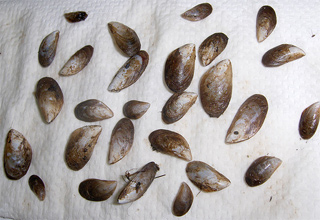More Invasive Mussels in Lake Michigan Than Fish in All the Seas
By JoshMogerman in Miscellaneous on Jul 24, 2010 9:00PM
A battle has been waged at the bottom of Lake Michigan as two species of invasive mussels duked it out for dominance. Since both are about the size of your pinkie nail, think of it as a Clash of the Tiny Titans. In the last year or two, a winner has quickly emerged as quagga mussels have largely overrun their more celebrated cousins, the zebra mussel. And they have won in such spectacular fashion; it seems that now there are more quagga mussels in Lake Michigan than there are fish in all of the world’s oceans combined!
When zebra mussels started clogging water intakes in the Lake 20 years ago, their arrival was met with a lot of attention and consternation. The quaggas came in the late 90’s with little fanfare. But in the years that followed, the heartier newcomer has largely squeezed out the their cousins (both species came from the Caspian Sea in the ballast water of cargo ships). As quagga numbers increased, the havoc wreaked by the mussels sped up quickly. Two years ago, the Trib eerily noted that the mussels had begun to completely change the ecosystem. The article detailed how the mussels’ voracious filter feeding had already begun clearing the murky water of the microscopic plants and critters central to the food chain. The cleared water allowed sun to reach the formerly dark and rocky lakebed transforming it to a new world carpeted with mussels and mats of algae for the first time.
This rapid change has Great Lakes scientists concerned. A recent Great Lakes Echo posting about newly observed mussel damage, reports ithat there may me nearly a quadrillion mussels in the Lake. Quadrillion? That is 18 zeros folks! For comparison, the Echo reports that there are only 4 trillion fish in the world’s oceans… Yikes! In some mussel-infested areas, they now represent up to 90% of all the living creatures of the Lake, meaning that they have squeezed out many native fish and mussel species. Researchers worry that as the survivors shift to new sources of food to replace the stuff that the mussels have filtered out, they will move to things like fish eggs, which will make the problems worse for the locals.
